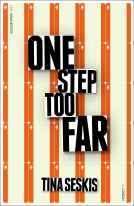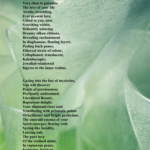Rising from the ashes – still crazy after all these years?
(with credit to Paul Simon)
I found this blog post from 5 years ago – interesting to reflect on how much has changed – writing this in France, in our dream home, for one thing – how much is the same – the actions I was choosing then I choose now, so perhaps they are perennials which keep life moving and us growing.
And, yes, definitely still crazy, and delighted to be so.
Ash Wednesday
Yesterday was Ash Wednesday, the first day of Lent for those who follow Christian traditions. I’m not a churchgoer any more, but I still recall the walk up the church aisle to experience the scratchy feel of ash being marked in the form of a cross onto my forehead by the priest. I guess it must have happened for each of the 14 years of my schooldays, and more.
I was brought up in a devout Roman Catholic family, and my childhood memories of Lent are about loads of pancakes on Shrove Tuesday prior to ‘giving up’ something I liked on Ash Wednesday for the remaining 40 days and 40 nights in preparation for Easter. It was usually chocolate. It probably still should be chocolate. Or wine. Or cheese.
Anyway, I haven’t given anything up for Lent for more years than I care to recall.
And I’m not about to start again.
Not Giving Up
I’ve decided to follow that hackneyed quote from Winston Churchill: ‘never, ever, ever…give up’.
But I am going to do something.
Not penance, but productivity.
Not denial, but delight.
I am going to do more.
No, not more chocolate, wine and cheese. Not more of anything material. But definitely more fun. More stuff that delights, surprises and stretches me. Maybe even more stuff that’s good for me like – walking and water.
Being pragmatic, things and actions I’m in control of:
- Meeting more people, online and offline
- Launching my leadership and transformation retreats at my new home in SW France
- Creating more crucial, constructive conversations
- Writing at least one blog every week
- More exuberance and fun
- More kindness and love
People Ideas Action
So I’m not giving anything up.
I’m keeping hold of what I have that I love.
But I am expanding my life with fresh people, ideas, and most crucially, actions. It’s going to be a fascinating forty days, for sure.
Spring Talks
And as part of the action – crucial, constructive conversations – if you would like to share your experiences I’m also doing a series of 5 minute ‘Spring Talks’ interviews for publication so contact me for more information and let me know if you want to join in.
Leave a message here or contact me via christine at christinemiller dot co (and no, the ‘co’ isn’t a typo, it’s correct)



 This piece is a quick snapshot of the event; every part of the day was valuable, and all will be included in fuller pieces to follow. There was a stellar line up of 20 speakers including guest of honour, Karen Armstrong (Charter for Compassion), Daniel Goleman (of Emotional Intelligence fame), Adam Grant (leading US business school Wharton’s youngest tenured professor and highest rated teacher) and Jo Berry, Founder of Building Bridges for Peace.
This piece is a quick snapshot of the event; every part of the day was valuable, and all will be included in fuller pieces to follow. There was a stellar line up of 20 speakers including guest of honour, Karen Armstrong (Charter for Compassion), Daniel Goleman (of Emotional Intelligence fame), Adam Grant (leading US business school Wharton’s youngest tenured professor and highest rated teacher) and Jo Berry, Founder of Building Bridges for Peace. The day began with a message, courtesy of David Rand, Executive Director of
The day began with a message, courtesy of David Rand, Executive Director of  Engagingly com-passionate Associate Professor of the University of Texas, Kristin Neff treated us to a range of techniques for being compassionate to ourselves as well as to others, so that we gave ourselves permission for self-compassion, Kristin’s area of interest and outstanding expertise. Kristin is author of the internationally acclaimed book
Engagingly com-passionate Associate Professor of the University of Texas, Kristin Neff treated us to a range of techniques for being compassionate to ourselves as well as to others, so that we gave ourselves permission for self-compassion, Kristin’s area of interest and outstanding expertise. Kristin is author of the internationally acclaimed book  A round table discussion gave us great insights from some active advocates and practitioners of compassion including Richard Barrett, an author, speaker and social commentator on the evolution of human values in business and society. He is the Founder and Chairman of the
A round table discussion gave us great insights from some active advocates and practitioners of compassion including Richard Barrett, an author, speaker and social commentator on the evolution of human values in business and society. He is the Founder and Chairman of the  Another panelist was Maureen Cooper, the author of ‘The Compassionate Mind Approach to Reducing Stress’, which is due to be published in the UK in September 2013.
Another panelist was Maureen Cooper, the author of ‘The Compassionate Mind Approach to Reducing Stress’, which is due to be published in the UK in September 2013. Also on the panel was inspirational and entertaining Kevin Jones, headmaster of St John’s College School in Cambridge, who was awarded the 2013 Tatler Prize for Best Headmaster. One of the school’s many strengths is its mindfulness programme, part of the school’s emotions for learning project designed to strengthen children’s emotional resilience.
Also on the panel was inspirational and entertaining Kevin Jones, headmaster of St John’s College School in Cambridge, who was awarded the 2013 Tatler Prize for Best Headmaster. One of the school’s many strengths is its mindfulness programme, part of the school’s emotions for learning project designed to strengthen children’s emotional resilience.
 The afternoon brought us a selection of valuable workshops, followed by examples of ways in which compassion is being encouraged in a number of organisations from Tesco, through
The afternoon brought us a selection of valuable workshops, followed by examples of ways in which compassion is being encouraged in a number of organisations from Tesco, through 








